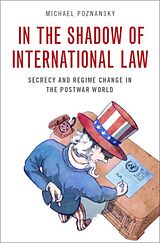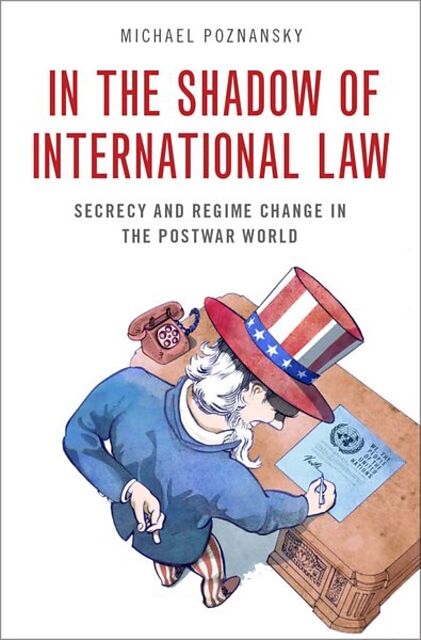In the Shadow of International Law
Einband:
Fester Einband
EAN:
9780190096595
Untertitel:
Secrecy and Regime Change in the Postwar World
Genre:
Politikwissenschaft
Autor:
Michael Poznansky
Herausgeber:
Oxford Academic
Anzahl Seiten:
264
Erscheinungsdatum:
24.07.2020
ISBN:
978-0-19-009659-5
If powerful states want to intervene in other states, why bother to hide it? Poznansky offers a carefully and compellingly argued response to this puzzling question: when intervening states can find a plausible justification in international law, they will engage in overt intervention; but when such justification is lacking, they will 'go covert.' Deeply researched and engagingly written, In the Shadow of International Law advances our understandings of the politics of international law as well as those of secret and not-so-secret interventions." -Tanisha Fazal, Associate Professor of Political Science, University of Minnesota
Autorentext
Michael Poznansky is Assistant Professor of International Affairs and Intelligence Studies in the Graduate School of Public and International Affairs at the University of Pittsburgh with a secondary appointment in the Department of Political Science. He is also a Non-Resident Fellow with the Modern War Institute at the United States Military Academy at West Point during the 2019-2020 academic year. Before arriving at the University of Pittsburgh, Dr. Poznansky was a predoctoral research fellow with the Belfer Center for Science and International Affairs at the Harvard Kennedy School. Dr. Poznansky has published in a wide range of scholarly journals, as well as policy-oriented outlets, including the Council on Foreign Relations' Net Politics Blog, Political Violence at a Glance,War on the Rocks, and The Washington Post.
Klappentext
In this book, Michael Poznansky asks why countries sometimes pursue activities such as regime change in the shadows rather than out in the open for the world to see. He finds that international law plays a key role in this decision-making process because senior government officials, especially in the United States, are sensitive to brazenly violating rules surrounding when countries should and shouldn't intervene in the internal affairs of others. He argues that while the existence of such restrictions don't always prevent great powers from undertaking regime change when it suits their interests, they do have meaningfully impacts.
Zusammenfassung
Secrecy is a staple of world politics and a pervasive feature of political life. Leaders keep secrets as they conduct sensitive diplomatic missions, convince reluctant publics to throw their support behind costly wars, and collect sensitive intelligence about sworn enemies. In the Shadow of International Law explores one of the most controversial forms of secret statecraft: the use of covert action to change or overthrow foreign regimes. Drawing from a broad range of cases of US-backed regime change during the Cold War, Michael Poznansky develops a legal theory of covert action to explain why leaders sometimes turn to covert action when conducting regime change, rather than using force to accomplish the same objective. He highlights the surprising role international law plays in these decisions and finds that once the nonintervention principle-which proscribes unwanted violations of another state's sovereignty-was codified in international law in the mid-twentieth century, states became more reluctant to pursue overt regime change without proper cause. Further, absent a legal exemption to nonintervention such as a credible self-defense claim or authorization from an international body, states were more likely to pursue regime change covertly and concealing brazen violations of international law. Shining a light on the secret underpinnings of the liberal international order, the conduct of foreign-imposed regime change, and the impact of international law on state behavior, Poznansky speaks to the potential consequences of America abandoning its role as the steward of the postwar order, as well as the promise and peril of promoting new rules and norms in cyberspace.
Inhalt
Chapter 1. Introduction
PART I: Background and Theory
Chapter 2. The Evolution of Nonintervention
Chapter 3. The Politics of Secret Interventions
PART II: Covert Regime Change
Chapter 4. Operation ZAPATA: Cuba
Chapter 5. Project FUBELT and Track II: Chile
PART III: Overt Regime Change
Chapter 6. Operation Power Pack: Dominican Republic
Chapter 7. Operation Urgent Fury: Grenada
PART IV: Conclusions and Implications
Chapter 8. The Future of Covert Regime Change

Leider konnten wir für diesen Artikel keine Preise ermitteln ...
billigbuch.ch sucht jetzt für Sie die besten Angebote ...
Die aktuellen Verkaufspreise von 6 Onlineshops werden in Realtime abgefragt.
Sie können das gewünschte Produkt anschliessend direkt beim Anbieter Ihrer Wahl bestellen.
Loading...
Die aktuellen Verkaufspreise von 6 Onlineshops werden in Realtime abgefragt.
Sie können das gewünschte Produkt anschliessend direkt beim Anbieter Ihrer Wahl bestellen.
| # | Onlineshop | Preis CHF | Versand CHF | Total CHF | ||
|---|---|---|---|---|---|---|
| 1 | Seller | 0.00 | 0.00 | 0.00 |
